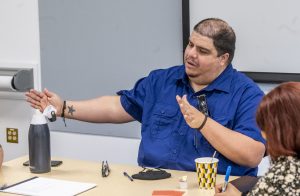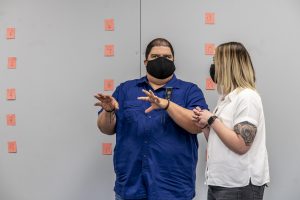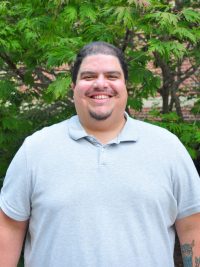Ray Martinez (Spanish and Portuguese) is a member of the 22–23 graduate cohort for “Imagining Otherwise: Speculation in the Americas,” the inaugural Interseminars initiative funded by the Mellon Foundation. He shares about his experiences with Interseminars below.
How has your understanding of “speculative practice” evolved over the course of this fellowship so far?

An aspect of my research that has evolved is the construction of identity/gender through crossdressing, specifically, women dressed as men (La Mujer Varón), who appropriated spaces socially designed exclusively for men in 16th and 17th century Spain and the Americas. My intention is to find women who lived as men in daily life, or on the theater stage, where female characters were often dressed as men to defend their honor or their loved ones, and to identify how their performance was helpful or not in their environment.
Engaging in speculative practice has been a definitive change in how to focus my research. In the seminars, we have done workshops and discussions about interdisciplinarity that had thrown me to think other possibilities from areas out of my comfort. I have learned to challenge everything, because in doing that new information could expand my research.
Before my participation in the Interseminars initiative, my investigation was stuck, so to speak, in a place and in an era. As soon as we started the seminar, my investigation was impacted by other theories and scholars. Through sharing of specific theory books with each other, I began ‘thinking otherwise,’ and as a result, my research has been de-centered.
“By just ‘imaging otherwise’ or ‘speculating’ and putting it in motion, it has not only turned my research into a transatlantic one, but it has also answered identity and other questions.”— Ray Martinez
Now, I have a theoretical and methodical response and explanation to these questions. To me, this has been a breakthrough, and we are only halfway. My investigation has taken a transatlantic turn, when I found Antonio de Erauso (Catalina de Erauso) and Eleno de Céspedes (Elena de Céspedes), two women who lived their lives as men. I intend to dig deeper into their lives. I plan to investigate how they managed to construct a male identity in an era where the church and the crown— in both the Old and the New World, prohibited cross-dressing and women having a voice in society. I am extremely excited about what the future of my research will look like after this experience with the Interseminars initiative.

How has the Interseminars Initiative impacted the way you approach your research?
The Interseminars initiative has helped me approach my research in many ways that I had never imagined before. For instance, in recent presentations done by the colleagues in the cohort, and in peer to peer workshops, I have learned different skills, methods, and approaches by contemplating how they approached their own research. I noticed the thousands of possibilities that there are to explore and to get results. Another crucial thing that I am learning from Interseminars is to keep my mind open to other perspectives and not to just narrow my alternatives when executing my research.
